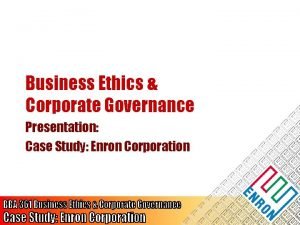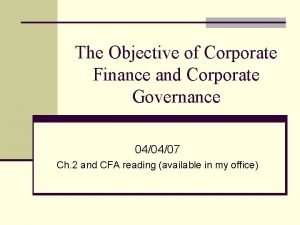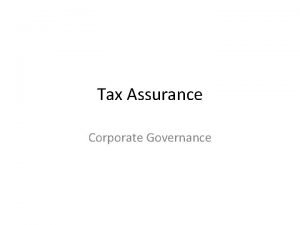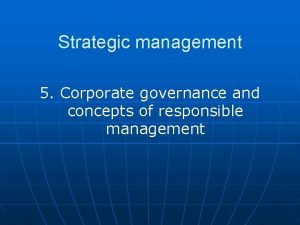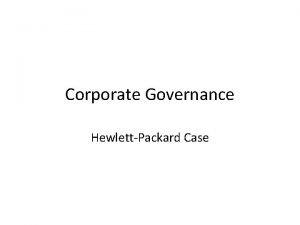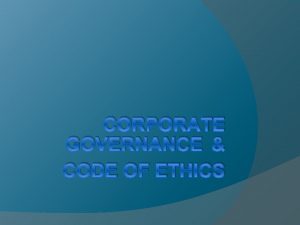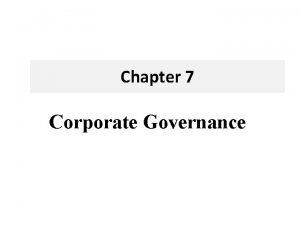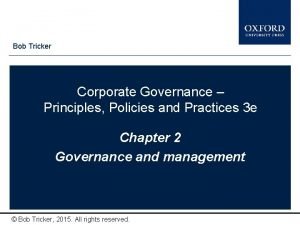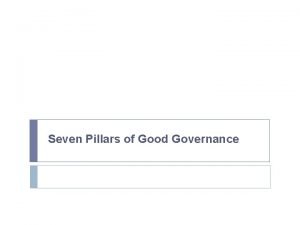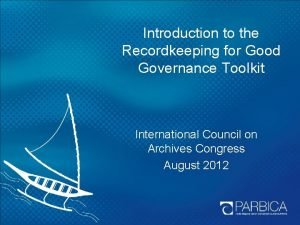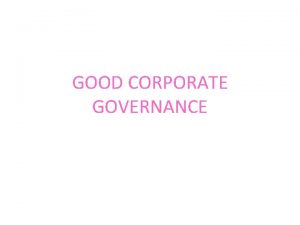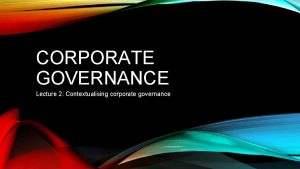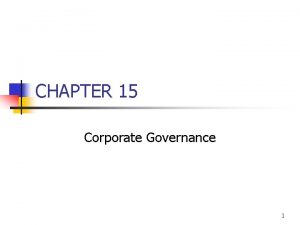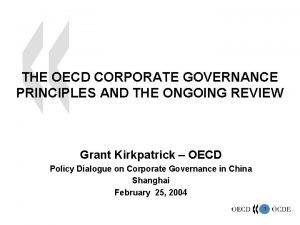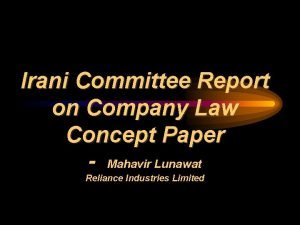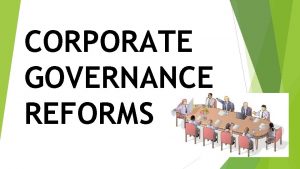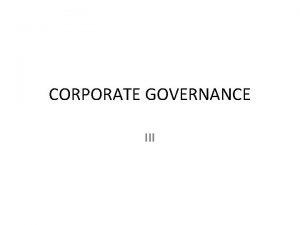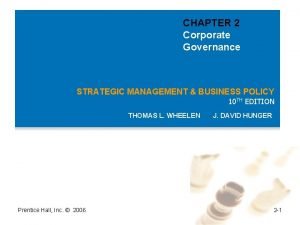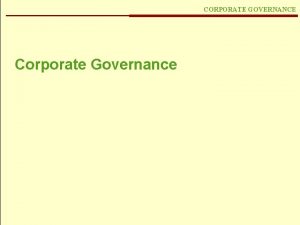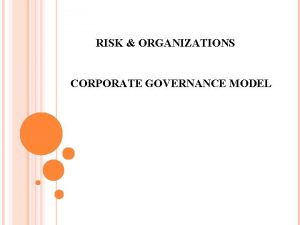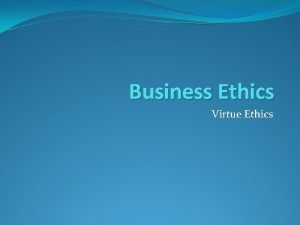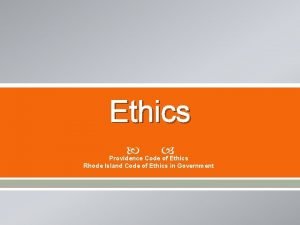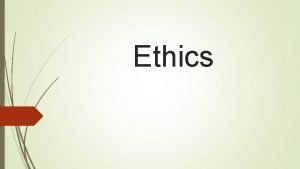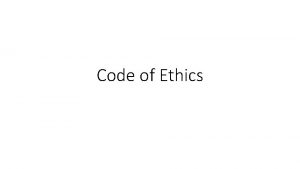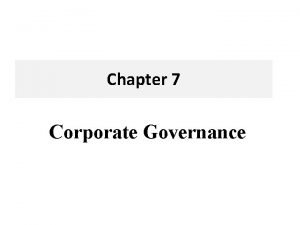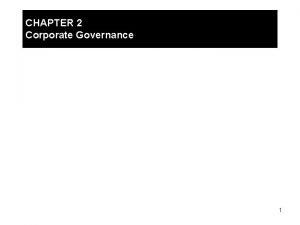CORPORATE GOVERNANCE CODE OF ETHICS What is corporate




































- Slides: 36

CORPORATE GOVERNANCE & CODE OF ETHICS

What is corporate governance? The system/ process by which business corporations are directed and controlled. Corporate governance is also concerned with how well organizations meet their obligations to all stakeholders—their owners, their customers, their vendor partners, state and local entities, and the communities in which they conduct their business operations.

Governance of the Modern Corporation Owners AUDIT COMMITTEE COMPENSATI ON COMMITTEE BOD CORPORATE GOVERNANCE COMMITTEE CEO, CFO, COO Managers and employees Stakeholders Customers, vendor partners, state and local entities, community partners Creditors

Board of Directors A group of individuals hired to oversee governance of an organization. Elected by vote of the shareholders at the annual general meeting (AGM) The true power of the board can vary from institution to institution from a powerful unit that closely monitors the management of the organization, to a “placeholder” body that “rubber-stamps” the decisions of the chief executive officer (CEO) and executive team.

Board of Directors The board is made up of inside and outside members that consists of diversity in the board. Inside members: hold management positions in the company Outside members: do not work in the company i. e. other company’s executives, retired managers, bankers, government executives, other professionals

Audit Committee An operating committee is staffed by members of the board of directors plus independent or “outside” directors. The committee is responsible for oversee the financial reporting process, monitoring the financial policies and procedures of the organization-specifically the accounting policies, internal controls, and the hiring of external auditors.

Compensation Committee An operating committee is staffed by members of the board of directors plus independent or “outside” directors. The committee is responsible for setting the compensation for the CEO and other senior executives. Typically, this compensation will consist of a base salary, performance bonus, stock options, and other perks.

Corporate Governance Committee The committee is staffed by board members and specialists, monitors the ethical performance of the corporation and oversees compliance with the company’s internal code of ethics as well as any federal and state regulations on corporate conduct.

CEO Chief Executive Officer (or Chief Executive or Managing Director): In charges of total management in firm Reports to Bo. Ds

CFO Chief Financial Officer: Responsible for managing financial risks of business Responsible for financial planning, record-keeping, and financial reporting to higher management Reports to CEO and Bo. Ds

COO Chief Operating (Operations) Officer: responsible for managing the day-to-day activities of the corporation and for operation management Ensures business operations are efficient and effective Ensures that proper management of resources, distribution of goods and services to customers Reports to CEO and Bo. Ds

Corporate Governance is about The way in which boards oversee the running of the company by its managers, and how board members are in turn accountable to shareholders and the company. This has implications or the company behavior towards employees, shareholders, customers, and the banks.

Example: http: //www. pg. com/en_US/company/global_structure_operations/governance/index. shtml

At Procter & Gamble, we have maintained strong Corporate Governance polices and practices for many years. Our actions — the actions of all employees — are governed by our Purpose, Values and Principles. These core values set a tone of integrity for the entire company—one that is reinforced consistently at all levels and in all countries.

Corporate Governance at P&G When employees behave as if they are owners of the company, the result is Corporate Governance at its best. That's why, more than a century ago, William Cooper Procter allowed employees to have a stake in the company. He recognized that when employees become shareholders, their interests and the interests of the company become inseparable.

Corporate Governance at Management, Shareholders and the Board Working Together Corporate Governance is the interaction of the management, shareholders and board of directors to help ensure that all investors — both shareholders and creditors — are protected against managers acting solely in their own best interest. Corporate Governance consists of laws, policies, procedures and, most importantly, practices that ensure the well-being of the assets of the company. Corporate Governance is at its highest levels when management is acting as if they are long-term investors in the company. The policies, procedures and practices spelled out in this Web site demonstrate that Procter & Gamble takes Corporate Governance very seriously. It is not hard for our management to act as long-term investors of the company because they, like most Procter & Gamble employees at all levels, are in fact long-term investors.

Corporate Governance at Employees Are Long-Term Investors In 1887, before P&G was even a publicly traded company, William Cooper Procter introduced a profit-sharing program for employees. At the time he said, "We should let the employees share in the firm's earnings. That will give them an incentive to increase earnings. " He revised that program in 1903 to have the profit sharing be awarded in the form of actual P&G stock. He reasoned that as employees became stockholders, their economic interests and those of the Company would be bound more closely together. That program still exists today with a large part of each U. S. employee's retirement consisting of P&G stock. Additionally, virtually all employees own P&G stock or stock rights via various investment programs. Because of that fact, employees' economic interests are aligned to those of the Company.

Corporate Governance at A Foundation of Integrity, Control and Stewardship P&G has a strong history of operating with integrity throughout the Company — at all levels, in all countries, both internally and externally. Our actions and the actions of all our employees are governed by our Purpose, Values and Principles. Our commitment to operate responsibly is reflected in the steps we have in place to ensure rigorous financial discipline and Corporate Governance. Ø We have an active and highly experienced Board of Directors, with members who understand their role in providing strong corporate governance. Our Audit Committee is comprised exclusively of independent directors, with appropriate financial skills to provide good oversight. The Audit Committee also meets regularly in private session with the Company's independent auditors, Deloitte & Touche.

Corporate Governance at Ø We maintain strong internal controls. Our rigorous business process controls include an ongoing program of audit self-assessment, and internal and external audits to ensure compliance with all relevant regulations and standards. Ø More than two years ago, we launched a financial stewardship program. It established broader organization focus in this area, strengthened financial discipline in our strategic and daily business decisions and provided clear accountability and ownership. Ø We reinforce key employee responsibilities through the Company's Worldwide Business Conduct Manual, which details management's and the Board of Directors' commitment to conduct the Company's business affairs with high ethical standards. Portions of the Worldwide Business Conduct Manual comprise P&G's Code of Ethics for SEC and New York Stock Exchange Regulatory Purposes, as further described in the Manual.

Corporate Governance at Doing What's Right P&G's reputation is earned by our conduct: what we say, what we do, the products we make, the services we provide and the way we act and treat others. As conscientious citizens and employees, we want to do what is right. For P&G, and our global operations, this is the only way to do business.

Impact of Corporate Governance Good corporate governance plays a vital role as in supporting the integrity and efficiency of financial markets. If companies are well governed, they will usually outperform other companies and will be able to attract investors whose support can finance further growth. Poor corporate governance weakens a company’s potential and at worst can lead to the financial difficulties and even fraud.

Effective Corporate Governance, Boards should: 1. Create a climate of trust and candor (honesty) The Bo. Ds and senior executives should be working in partnership toward successful achievement of organizational goals

Effective Corporate Governance, Boards should: 2. Foster a culture of open dissent (conflict, disagreement) Proposals should be opened for frank discussion and review rather than alleged rubber-stamping. Dissent ensures that all aspects of proposals are reviewed and discussed thoroughly.

Effective Corporate Governance, Boards should: 3. Mix up roles Rotation of assignments can avoid typecasting, and conscious effort to switch between “good cop” and “bad cop” roles can ensures positive debate of all key proposals brought before the boards.

Effective Corporate Governance, Boards should: 4. Ensure individual accountability If there is significant fallout from a major strategic initiative, all members should consider themselves accountable which are responsible and explainable for every decisions have been made.

Effective Corporate Governance, Boards should: 5. Let the board assess leadership talent The board members should be actively meet with future leaders in their current positions within organization rather than simply waiting for them to be presented when a vacancy arises.

Effective Corporate Governance, Boards should: 6. Evaluate the board’s performance Effective corporate governance demands superior performance from everyone involved in the process.

Code of Ethics Code of Conduct

Code of Ethics or Code of Conduct A company’s written standards of ethical behavior that are designed to guide managers and employees in making the decisions and choices that they face everyday.

Major purposes of ethics codes: To state corporate leaders’ dominant values and beliefs, which are the foundation of the corporate culture Ø To define the moral identity of the company inside and outside the firm Ø To set the moral tone of the work environment Ø To provide a more stable, permanent set of guidelines for right and wrong actions Ø

Major purposes of ethics codes (cont’d): Ø To provide an instructional and motivational basis for training employees regarding ethical guidelines and for integrating ethics into operational policies, procedures, and problems Ø To provide an added means of socializing professionals, not only in specialized knowledge, but also in beliefs and practices the company values or rejects

The Ethics Resource Center defines a code of ethics as: A central guide to support day-to-day decision making at work. It clarifies the cornerstones of your organization-its mission, values and principleshelping your managers, employees and stakeholders understand how these cornerstones translate into everyday decisions, behaviors and actions. While some may believe codes are designed to limit one’s actions, the best codes are actually structured to liberate and empower people to make more effective decisions with greater confidence.

Example: J&J’s Credo

Problems with Ethical Codes Most codes are too vague (unclear due to not enough details) to be meaningful Codes do not prioritize beliefs, values, and norms Codes are not enforced in firms All employees are not informed of codes

Insider trading An unethical activity in which insiders use private company information to further their own fortunes or those family and friends (Insider: someone who has a special knowledge of a particular organization because he/she is part of it)

Insider Trading Case Martha Stewart, the homemaking diva was sentenced to 5 months in prison and 2 years' probation for lying to investigators about her sale of Im. Clone Systems stock in 2004. Stewart ended up in prison because she sold her Im. Clone stock one day before bad news (the Food and Drug Administration's rejection of the firm's new cancer drug) caused the stock price went down sharply. She was investigated for using insider information for her own gain.
 Enron case study
Enron case study Corporate finance and corporate governance
Corporate finance and corporate governance Mbhni hgwpi
Mbhni hgwpi Busceral
Busceral Sociological theory of corporate governance
Sociological theory of corporate governance Definitie corporate governance
Definitie corporate governance Corporate governance in strategic management
Corporate governance in strategic management Role of corporate governance in strategy formulation
Role of corporate governance in strategy formulation Isu dan riset kontemporer corporate governance
Isu dan riset kontemporer corporate governance Pillars of corporate governance
Pillars of corporate governance Ifc corporate governance
Ifc corporate governance Corporate governance in sri lanka
Corporate governance in sri lanka Hp corporate governance
Hp corporate governance P&g code of conduct
P&g code of conduct Meaning of corporate governance
Meaning of corporate governance Corporate governance and social responsibility
Corporate governance and social responsibility Tricker
Tricker Principle based corporate governance
Principle based corporate governance Pillars of good governance
Pillars of good governance Corporate governance is a form of
Corporate governance is a form of Corporate governance tool kit
Corporate governance tool kit Good governance and corporate social responsibility
Good governance and corporate social responsibility Latar belakang munculnya good corporate governance
Latar belakang munculnya good corporate governance Corporate governance lecture
Corporate governance lecture Potential problems in corporate governance
Potential problems in corporate governance Examples of agency problems
Examples of agency problems Cadbury committee report ppt
Cadbury committee report ppt Oecd corporate governance principles
Oecd corporate governance principles Corporate governance oecd
Corporate governance oecd Corporate governance definition
Corporate governance definition Irani committee report
Irani committee report Corporate governance reforms in india
Corporate governance reforms in india Corporate governance clause 49
Corporate governance clause 49 Scope of corporate governance
Scope of corporate governance Corporate governance strategic management
Corporate governance strategic management Insider and outsider system of corporate governance
Insider and outsider system of corporate governance Global corporate governance forum
Global corporate governance forum
